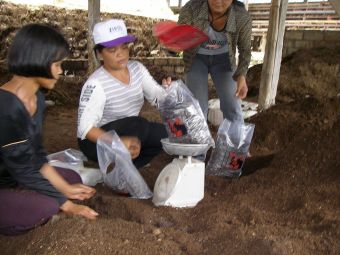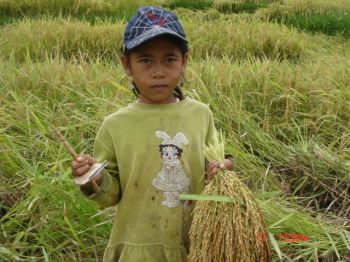Organic farming takes root in post-bomb Bali
Graeme MacRae
Old rice varieties are still harvested the old way, one stalk at a time, using a small blade held between the fingers.
|
In the 1990s, the tourism industry in Bali boomed. Many Balinese became rich during this period. But farmers, the traditional upholders of the Balinese economy, became poorer. Costs of agricultural production and the cost of living went up, and the price of agricultural products, especially rice, rose very little. Farmers turned to other work, usually in tourism-related sectors, to make a living. Farmland was converted to other (usually tourism-related) uses. Young people were more attracted to the glamorous prospects offered by tourism than the hard work, dirty clothes and poor pay of farming.
The bombs in Kuta in October 2002 were not the end of tourism, but they were the beginning of the end of the fantasy, blindly held through the boom-years, that tourism was a sustainable long-term base for the Balinese economy. In the wake of the bomb, some advocated a more diversified and sustainable economic base. Many realised that agriculture had been forgotten - or at least marginalised - and that it should perhaps be reinstated at the centre of Balinese culture and economy. Some policy makers suggested developing ‘agro-industri’ and ‘agri-bisnis’ to compete in the global market.
Alternative voices
Amidst the hubbub of support for large-scale industrialisation of agriculture, there were also smaller voices talking about alternative approaches to agricultural development: returning to traditional crops, locally-based sustainable development, agri- and/or eco-tourism and organic production. Apart from the obvious health and environmental reasons, the logic was that such methods could lower production costs and produce potentially more valuable crops.
Since the second bombing in 2005, tourism numbers have slowly returned to something resembling pre-bomb levels. The memories have faded, the tourism fantasy has gradually reasserted itself, and a real post-tourism economy has yet to take shape. Some seeds of it have been sown though, mostly in the form of enterprises that feed off or into tourism in various ways: a shift from providing tourism facilities to longer-term expatriate and business accommodation, meeting and conference facilities, international hospitals and health centres. The smart operators, the big players, have quietly moved at least some of their investment out of tourism into real estate, or anything less vulnerable than tourism.
Earlier this decade it seemed rice-farming might die out altogether in Bali
At the same time, somewhat less spectacularly, the agriculture sector has begun to transform itself, from the production of rice and subsidiary crops for subsistence, to a growing emphasis on cash crops. While some of the problems of Balinese agriculture have been exacerbated by tourism-driven prosperity and cultural modernisation, tourism has also provided new opportunities for agriculture, including a growing range of niche markets for premium and healthy foods for hotels, restaurants and the expatriate community.
Organic (or at least chemical-free) production has a potential double advantage: reducing the cash production costs for fertilizers and pesticides, plus producing a higher-cost product for this premium market. Several expatriate land-owners began growing organic food for their own families, but also as examples they hoped their neighbouring farmers might follow. Market gardeners in the mountains were quick to see these opportunities and many of them have converted to more or less organic production methods, to lower production costs as well as increasing the value of their crops.
But rice-farmers were not so quick to change. They tended to see all the reasons organic crops might fail, they felt that whole subaks (irrigation cooperatives) needed to change together and were not confident about marketing their produce. Earlier this decade, around 2003, it seemed that rice-farming might have to die out before anything changed. But since then something has changed. Here are three examples:
Growing rice differently
 |
Processing and packing compost for sale provides employment for local women.IWA Arthawiguna |
Prana Dewi Resort is a yoga and health retreat on the slopes of Mt. Batu Karu in the southwest of Bali. It was developed on the family land of a local man married to a German woman. They needed to feed their guests and they wanted to provide healthy, chemical-free food with a local flavour. In 1998, they began growing traditional rice varieties and reducing their use of synthetic fertilizers. They now produce at higher levels than previously. Neighbouring farmers have begun following their example and they have now formed a group for joint marketing of their produce. What began as a specialist tourism enterprise has expanded to become a wider movement of agricultural and economic change.
In the next valley is Wangaya Betan, where in 2005, a small group of farmers, guided by an innovative government agricultural scientist, began converting their wastes from rice, chicken, coffee and cocoa production into feed for cattle. They composted the manure to produce organic fertiliser and substituted it progressively for synthetic fertilisers over three planting seasons. They also began using an improved system of seed selection, raising and planting, known as SRI (System of Rice Intensification).
Their yields improved immediately while their production costs reduced dramatically. Since then virtually the whole subak has followed them and neighbouring subaks have begun to change also. They obtained a government grant to establish a training centre and now they are training farmers from elsewhere in Bali and Indonesia.
In Payangan, on the outskirts of the tourism centre of Ubud, two unusual men are introducing organic methods to local farmers. Wayan Kubu is a government agricultural extension officer employed to provide advice and expert knowledge to farmers. He attended permaculture courses run by IDEP, an NGO in Ubud, and was sufficiently impressed that he began telling farmers about them.
Nyoman Sanjaya is the head (pekaseh) of a local subak. He spent many years working in Jakarta and when he returned home he wanted to return also to farming. He bought some land, established a rice-mill, and when he was elected as pekaseh he immediately began mobilising subak members to repair their run-down irrigation system.
The new projects involve post-tourism visions of what economic development can be
When he heard about SRI from Pak Kubu he decided to try it on his own fields. His yield immediately increased from 6 tonnes to 8 tonnes per hectare. As in the other projects, his neighbours began to follow and now one third of the subak are using SRI. Now Pak Sanjaya is beginning to progressively replace his synthetic fertilizer with cow manure and is thinking about returning to traditional varieties.
So things are changing in the ricefields. But these and other similar projects appearing all over Bali are not just about agriculture and even less about tourism - they involve distinctively post-tourism visions of what economic development could be. Some of them sell their produce to the tourism industry, but none of them depend on it. If tourism flourishes again, they will prosper as a result. But none of them is designed for tourism - all of them will work, albeit in different ways, whether tourism flourishes again or not. They hold the promise of a post-tourism agriculture and a healthier, less dependent relationship with tourism. ii
Graeme MacRae (G.S.Macrae@massey.ac.nz) teaches Social Anthropology at Massey University Auckland, New Zealand. He has been researching in Bali since 1993 and has published on a wide range of topics. Nowadays he tries to make his research useful by focusing on sustainable development projects. In his spare time he grows organic fruit and vegetables.












